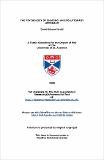Files in this item
The psychology of sharing: an evolutionary approach
Item metadata
| dc.contributor.advisor | Whiten, Andrew | |
| dc.contributor.author | Erdal, David Edward | |
| dc.coverage.spatial | 247 | en_US |
| dc.date.accessioned | 2012-06-05T15:29:30Z | |
| dc.date.available | 2012-06-05T15:29:30Z | |
| dc.date.issued | 2000 | |
| dc.identifier.uri | https://hdl.handle.net/10023/2656 | |
| dc.description.abstract | This thesis takes an evolutionary perspective on human psychology. To the extent that inherited tendencies shape behaviour, their design will be fitted to the social environments prevailing as Homo sapiens evolved, in foraging groups, the nearest modem equivalent being hunter-gatherers. From ethnographies of hunter-gatherers, food-sharing and counterdominance were identified as universal. Food-sharing was more thorough than is explicable purely by kinship or reciprocation; one functional effect was to even out the supply of valuable high-variance food. In contrast with the social systems of the other great apes, counter-dominance spread influence widely, preventing the emergence of dominant individuals who could obtain resources disproportionately. Potential paths for the evolution of egalitarian tendencies are discussed. Two falsifiable hypotheses were generated from this perspective. First, sharing will facilitate risk-taking. The predicted effect was confirmed at high risk levels, similar to those faced by hunters. Given that during evolution risk was reduced primarily by social means, social as well as rational factors are treated by the evolved brain as relevant to risky decisions. It is argued that this result may suggest a new perspective on the Group Polarisation experiments. The second hypothesis tested was that an egalitarian environment will produce beneficial effects on individual and social behaviour. The data collected were consistent with the hypothesis: a comparison between three Italian towns showed that measures of health (including cardiovascular mortality), education, social involvement, crime and social perceptions were significantly more positive where co-operatives employed a larger percentage of the population. The evolutionary perspective showed its value as a means of generating novel testable hypotheses. | en_US |
| dc.language.iso | en | en_US |
| dc.publisher | University of St Andrews | |
| dc.rights | Creative Commons Attribution-NonCommercial-NoDerivs 3.0 Unported | |
| dc.rights.uri | http://creativecommons.org/licenses/by-nc-nd/3.0/ | |
| dc.subject.lcc | BF701.E8 | |
| dc.subject.lcsh | Evolutionary psychology | en_US |
| dc.subject.lcsh | Behavior evolution | en_US |
| dc.title | The psychology of sharing: an evolutionary approach | en_US |
| dc.type | Thesis | en_US |
| dc.type.qualificationlevel | Doctoral | en_US |
| dc.type.qualificationname | PhD Doctor of Philosophy | en_US |
| dc.publisher.institution | The University of St Andrews | en_US |
This item appears in the following Collection(s)
Except where otherwise noted within the work, this item's licence for re-use is described as Creative Commons Attribution-NonCommercial-NoDerivs 3.0 Unported
Items in the St Andrews Research Repository are protected by copyright, with all rights reserved, unless otherwise indicated.


